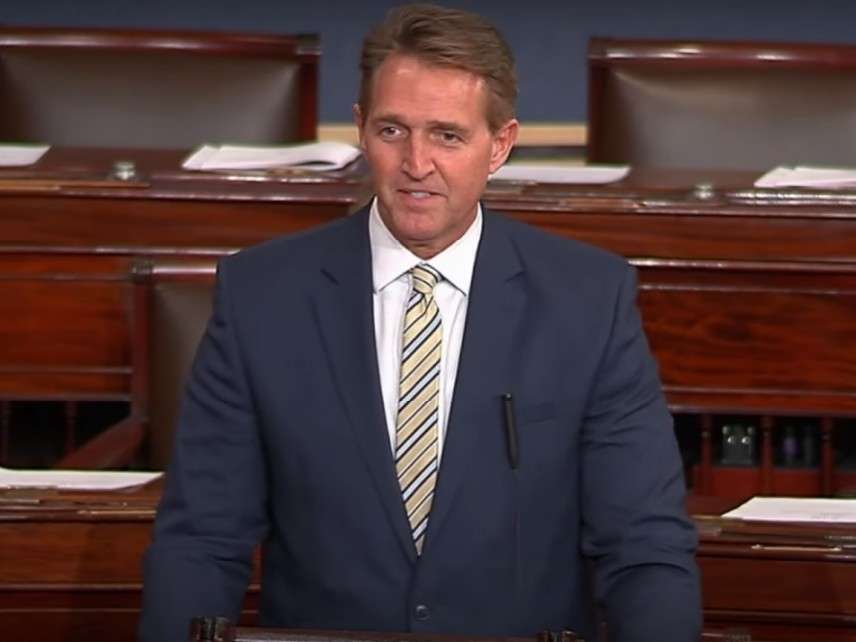Jeff Flake Highlights Donald Trump's Rhetorical Kinship With Censorious Autocrats
The crucial difference is not temperamental but institutional.

I'm not sure 2017 was the year in which the truth was "more battered and abused than any other in the history of our country," as Jeff Flake declared in his Senate floor speech today. But the Arizona Republican, a longtime critic of Donald Trump who decided not to seek re-election this year, is right that the president combines a blatant disregard for the truth with an open contempt for the press in a way that sets him apart from any of his recent predecessors. As Flake noted, those tendencies are especially evident in the rhetoric that Trump borrows from and lends to dictators of the past and present.
"Our own president uses words infamously spoken by Josef Stalin to describe his enemies," Flake said. "It bears noting that so fraught with malice was the phrase 'enemy of the people,' that even Nikita Khrushchev forbade its use, telling the Soviet Communist Party that the phrase had been introduced by Stalin for the purpose of 'annihilating such individuals' who disagreed with the supreme leader."
Trump, who planned to announce "Fake News Awards" today recognizing the "most corrupt and dishonest" reporting of 2017, has clarified that he does not think all journalists are "enemies of the people"—only the ones who make him look bad. In his original formulation, Trump condemned "the FAKE NEWS media" as "the enemy of the American People," a category in which he specifically included The New York Times, CNN, ABC, CBS, and NBC. Fox News, presumably, is not an enemy of the people, and neither is The Federalist's Adam Levine, who recently received Trump's gratitude for opining on Fox News that "Donald Trump is the greatest president our country has ever seen."
As Jesse Walker has noted, the phrase "fake news" originally referred to hoaxes but was quickly extended to sloppy reporting that was false but not consciously so and even to real news with an ideological spin. In Trump's hands, it became an all-purpose epithet for anything negative a journalist might say about him, true or not. It is disturbing (but not surprising) to see authoritarian leaders of other countries echo this usage. Flake offered examples from a December 8 report in Politico:
"In February…Syrian President Bashar Assad brushed off an Amnesty International report that some 13,000 people had been killed at one of his military prisons by saying, 'You can forge anything these days, we are living in a fake news era.'
"In the Philippines, President Rodrigo Duterte has complained of being 'demonized' by 'fake news.'" Last month, the report continues, with our President, quote "laughing by his side," Duterte called reporters "spies."
In July, Venezuelan President Nicolas Maduro complained to [RT], the Russian propaganda outlet, that "the world media had 'spread lots of false versions, lots of lies' about his country, adding, 'This is what we call "fake news' today, isn't it?"
There are more:
"A state official in Myanmar recently said, 'There is no such thing as Rohingya. It is fake news,' referring to the persecuted ethnic group….
"Leaders in Singapore, a country known for restricting free speech, have promised 'fake news' legislation in the new year."
The point is not that Assad et al. would be more tolerant of dissent without Trump's example. Matt Welch is appropriately skeptical of attempts to blame Trump for a global downturn in press freedom. But it surely is embarrassing that the self-styled Leader of the Free World talks this way and thereby lends rhetorical cover to censorious thugs. "Not only has the past year seen an American president borrow despotic language to refer to the free press," Flake said, "but it seems he has in turn inspired dictators and authoritarians with his own language."
The shared language is of a piece with Trump's disquieting praise for strongmen who get things done, including Duterte, Vladimir Putin, Saddam Hussein, and the Chinese leaders responsible for the Tiananmen Square Massacre. The crucial difference between Trump and the autocrats he admires is not temperamental but institutional. Unlike them, Trump is constrained by constitutional limits that prevent him from putting flag burners in jail, punishing "fake news" outlets by taking away their broadcast licenses, or passing a law making it easier for him to win defamation suits against his critics.
If warnings about the imminent demise of a free press in America seem overwrought, it is because those restraints, rather miraculously, still have teeth after more than two centuries. Thanks to that fact, freedom of speech can easily survive the election of a thin-skinned, loudmouthed bully as president.


Show Comments (60)